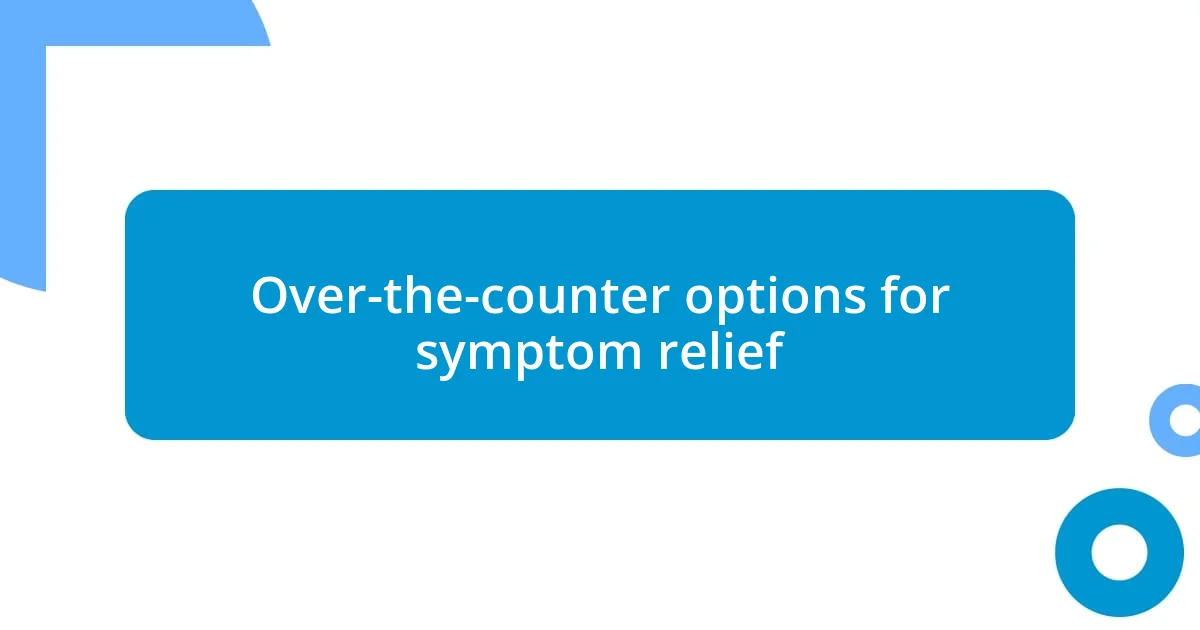Key takeaways:
- Morning sickness symptoms can vary widely among women, often triggered by strong smells, certain foods, and hormonal changes, typically peaking around the sixth week of pregnancy.
- Natural remedies like ginger, peppermint, and small meals can be effective in alleviating nausea, while over-the-counter options like vitamin B6 and antihistamines may also provide relief when needed.
- It’s important to seek medical advice if symptoms worsen, such as inability to keep food down, severe pain, or if nausea interferes with daily life, as these may indicate serious complications.

Understanding morning sickness symptoms
Morning sickness, though often associated with nausea and vomiting, can manifest in various ways. I remember waking up feeling like I was on a relentless rollercoaster, with waves of nausea that would come and go unexpectedly. How many of you found that even the smell of breakfast could send your stomach into a tailspin? It’s amazing how our bodies react to this hormonal rollercoaster.
Many women experience heightened sensitivity to smells, which can trigger nausea. I vividly recall a moment when my partner cooked a batch of garlic butter shrimp, a dish I usually loved. Instead of savoring it, all I could do was run to the bathroom. It made me question why such a delightful aroma suddenly felt like my worst enemy. Those little nuances can make the experience feel isolating yet oddly relatable when you share it with others.
Morning sickness typically peaks around the sixth week of pregnancy and can last until the end of the first trimester. For some, like me, it lingered beyond that initial timeline, throwing a real curveball during the early months. It’s puzzling, isn’t it? Why do some women sail through without a hitch while others struggle day in and day out? Each experience tells a different story, and understanding these symptoms can be a crucial step towards finding effective ways to cope.

Recognizing triggers of morning sickness
Recognizing morning sickness triggers can feel like deciphering a complex puzzle, especially when everything seems to affect your stomach. I vividly recall a sunny day when I decided to grab a coffee from my favorite café. Just that one sip was enough to send me bolting back home—how disappointing it was to realize that something I once cherished had become a source of discomfort. Listening to our bodies can reveal surprising insights, as often what we love turns into what we dread.
Identifying specific smells that provoke nausea can be a game-changer. For instance, I noticed that certain cooking spices like cinnamon and cumin seemed to amplify my symptoms. During one cooking session, I found myself suddenly overwhelmed and had to step outside for fresh air. It’s fascinating how our senses connect to our experiences, making us more aware of our surroundings. What triggers have you discovered in your own mornings? Each nuance helps to narrow down the many possibilities.
Certain foods were also tricky for me. Even foods I craved could unexpectedly trigger nausea. There were days when I’d indulge in a smoothie, only to find myself regretting it shortly after. Perhaps, like me, you’ve learned what to avoid, even if it sometimes means missing out on your go-to snacks. Finding these patterns not only helps alleviate symptoms but also empowers you to make choices that align with your body’s needs.
| Triggers | Response |
|---|---|
| Strong smells (perfumes, cooking spices) | Nausea increases, often leading to vomiting |
| Certain foods (smoothies, coffee) | Craving followed by discomfort |
| Hunger or empty stomach | Intensification of nausea |
| Stress or anxiety | Heightened sensitivity to nausea |

Natural remedies for morning sickness
Natural remedies can provide relief from morning sickness, often offering a gentler approach than medication. I found that ginger was my unexpected ally. Whether I sipped on ginger tea or nibbled on ginger candies, each bit seemed to ease the waves of nausea. The soothing properties of ginger have been widely recognized, but it felt like a personal discovery for me, turning a simple ingredient into a lifeline during those tough mornings.
Here are some natural remedies that many find helpful:
- Ginger: Ginger tea, candies, or even ginger ale can be really effective.
- Peppermint: Peppermint tea or mints can help settle the stomach.
- Lemon: Sniffing or sipping lemon-flavored drinks can alleviate nausea.
- Acupressure: Applying pressure to specific points, like the wrist, has brought me some relief.
- Hydration: Sipping on clear fluids throughout the day keeps nausea at bay.
- Small meals: Eating small portions throughout the day rather than large meals can help keep nausea levels down.
I remember tossing a few peppermint candies into my bag before heading out, feeling like I was equipping myself for battle. Just knowing I had those little helpers in reach made the situation feel more manageable. Each remedy became part of my daily routine, almost like a comforting ritual to start my day on a better note.

Over-the-counter options for symptom relief
Over-the-counter options can sometimes be the answer when natural remedies don’t cut it for morning sickness. I remember browsing the pharmacy aisles, feeling a bit overwhelmed by the sheer number of products available. Something as simple as vitamin B6 supplements—the pharmacist suggested it—and I was surprised at how much it eased my symptoms. It felt like finding a key to a lock I didn’t know existed.
There are also anti-nausea medications like doxylamine, which is often found in combination with other drugs. I hesitated at first—what if it made me groggier? Eventually, though, I took the plunge and discovered that it helped me manage those intense nausea waves while still allowing me to function throughout my day. Have you ever found yourself in a similar situation, weighing the pros and cons of medication? It’s so important to have that open conversation with your healthcare provider to see what’s best for you.
Additionally, some expectant mothers find relief through products like antihistamines, which can reduce nausea. It’s all about what works for your body. For me, the right over-the-counter option turned those morning battles into manageable moments, something I hadn’t thought was possible before. Sharing these little victories with fellow expectant moms brought a sense of camaraderie, reminding me that we’re all navigating our own paths—sometimes with a bit of extra help from the shelf.

When to seek medical advice
It’s crucial to recognize when your morning sickness may be signaling something more serious. If you find that you’re unable to keep any food or fluids down for more than 24 hours, it’s definitely time to reach out to your healthcare provider. I remember feeling increasingly anxious during those moments, wondering if I was doing lasting damage, and the reassurance from my doctor was invaluable.
Additionally, if your symptoms become accompanied by severe abdominal pain, dizziness, or an unusual increase in heart rate, don’t hesitate to seek medical advice. These signs can often indicate dehydration or other complications that require attention. I recall a worrying episode where my heart raced unexpectedly, which reinforced how important it is to listen to your body—it knows when something’s off.
Lastly, if your nausea and vomiting interfere with daily life or emotional well-being, don’t suffer in silence. It’s perfectly okay to ask for help, be it medical or from loved ones. I learned that discussing my struggles not only lightened my emotional load but also opened doors to various solutions I hadn’t considered before. Remember, taking care of your health is a priority, and you deserve support when navigating this challenging period.














